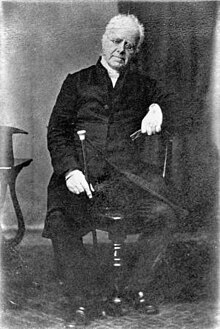Henry Williams (missionary)
| Henry Williams | |
|---|---|

Williams about 1865
|
|
| Born |
11 February 1792 Gosport, England |
| Died | 16 July 1867 (aged 75) Pakaraka, Bay of Islands, New Zealand |
| Nationality | British |
| Other names | Te Wiremu and Karu-whā |
| Occupation | Missionary |
| Spouse(s) | Marianne Williams (née Coldham) |
| Relatives |
The Rev. William Williams (brother) Edward Marsh Williams (son) The Rev. Samuel Williams (son) Henry Williams (son) John William Williams (son) Hugh Carleton (son-in-law) The Revd Octavius Hadfield (son-in-law) |
Henry Williams (11 February 1792 – 16 July 1867) was the leader of the Church Missionary Society (CMS) mission in New Zealand in the first half of the 19th century.
Williams entered the Royal Navy at the age of fourteen and served in the Napoleonic Wars. He went to New Zealand in 1823 as a missionary. The Bay of Islands Māori gave Williams the nickname Karu-whā ("Four-eyes" as he wore spectacles). He was known more widely as Te Wiremu. ('Wiremu' being the Māori form of 'William'). His younger brother, William Williams, was also a missionary in New Zealand and known as "the scholar-surgeon". Their grandfather, the Reverend Thomas Williams (1725–1770), was a Congregational minister at the Independent Chapel of Gosport.
Although Williams was not the first missionary in New Zealand – Thomas Kendall, John Gare Butler, John King and William Hall having come before him – he was "the first to make the mission a success, partly because the others had opened up the way, but largely because he was the only man brave enough, stubborn enough, and strong enough to keep going, no matter what the dangers, and no matter what enemies he made".
In 1840 Williams translated the Treaty of Waitangi into the Māori language, with some help from his son Edward.
On 21 September 1844 Williams was installed as Archdeacon of Te Waimate in the diocese centred on Te Waimate mission.
Williams was the son of Thomas Williams (Gosport, England, 27 May 1753 – Nottingham 6 January 1804) and Mary Marsh (10 April 1756 – 7 November 1831) who had married in Gosport on 17 April 1783. Thomas Williams was a supplier of uniforms to the Royal Navy in Gosport. In 1794 Thomas and Mary Williams and their six children moved to Nottingham, then the thriving centre of the East Midlands industrial revolution. Thomas Williams was listed in the Nottingham trade directories as a hosier. The industry was based on William Lee's knitting machine. The business was successful. Thomas Williams received recognition as a Burgess of Nottingham in 1796 and as a Sheriff of Nottingham in 1803. However the prosperity which had been such a feature of the hosiery industry in the second half of the 18th century ended. In 1804, when Thomas Williams died of typhus at the age of 50, his wife was left with a heavily mortgaged business with five sons and three daughters to look after.
...
Wikipedia
